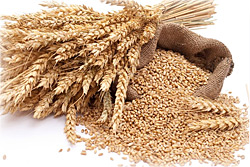Grains are a popular topic of discussion when it comes to dog foods and cat foods these days. Flint River Ranch addresses the pet food topic du jour by first discussing when you might want to feed a grain-free pet food diet vs. one with grains, and then we share some of the important nutritional benefits that grains can provide.
We regularly hear from customers with questions about pet products and what they should feed to their pets. Some wonder if a grain-free diet would be better than one that contains some grains.
Truly, there is not one type of pet food diet that is best for every dog and cat in the world. All pets have different metabolism and nutritional needs, and results will vary depending on the pet’s individual metabolism and the nutrition that is presented.
Flint River Ranch has always advocated adjusting your pet’s diet to meet their nutritional needs, which means some pets may do well on a grain-free kibble while others will find success with formulas that have healthy grains or a unique carbohydrate mix.
It is important to remember that what holds dry kibble together when it’s cooked (or baked as in the case of Flint River Ranch products) is its carbohydrate source. All dry kibbles need a carbohydrate to bind the ingredients together.
What this means is that “Grain-free” does not equate to being carbohydrate-free. Carbohydrates can be from a grain source like potatoes, conventional grains, tapioca or non-cereal grains.
Here are some of the popular carbohydrates used in making dry kibble for dogs and cats:
- Brown Rice: A complex carbohydrate that (once cooked) is fairly easy to digest. Brown Rice is a source of fiber and contains magnesium, four different B-vitamins, calcium, iron, protein and zinc.
- Oatmeal: A grain that is naturally rich in soluble and insoluble fiber, B-vitamins, Vitamin E, Zinc, Selenium, Copper, iron, protein, calcium, Manganese and Magnesium. Oatmeal is also considered gluten free.
- Millet: Not a grain, but rather a grass seed, Millet is Gluten Free, high in fiber as well as protein, B-complex vitamins, calcium, zinc, iron, and Vitamin E. Millet also contains essential amino acids (18 amino acids in fact!).
- Potato: Quick and easy to digest, Potatoes are Gluten Free and offer high Vitamin C, B-complex, potassium, magnesium, phosphorus and zinc.
- Sweet Potato: Easy to digest, Gluten Free and high in Vitamin B6, Vitamin C, Vitamin D, Iron, Magnesium, Potassium, and carotenoids (antioxidants).
- Peas: Gluten Free and high in Vitamin-B complex, Vitamin C, Vitamin K, Vitamin A, Calcium, Iron, Copper, Zinc, Protein and Manganese.
- Tapioca: A fiber source that is Gluten Free and rich in calcium, phosphorous, potassium, iron, B-vitamins, and Magnesium.
- Quinoa: Quinoa is a Seed from a vegetable plant related to spinach and beets, and is not considered a grain. Quinoa is high in protein and fiber, is Gluten Free and rich in Vitamin B-complex, and is a complex carbohydrate.
- Whole Wheat: Whole wheat is a good source of fiber, is easy to digest, and contains protein, calcium, Vitamins B6, E & K, manganese, magnesium, iron, phosphorus, zinc, selenium and copper.
- Chickpeas (Garbanzo beans): Chickpeas are Gluten Free and contain protein, calcium, iron, magnesium, phosphorus, potassium, zinc and Vitamins A, E, K & C.Rich in B Vitamins.
- Lentils: Contain protein, Vitamins B, C, E, K, phosphorus, potassium, copper, selenium, calcium, iron and manganese. Lentils are Gluten Free.
The nutritional benefits of the above ingredients are not 100% complete — there are other trace minerals and vitamins in the ingredients used to make various pet food formulas. Some of these ingredients listed are gluten free, while others are not.
Our point is to show you that there are a variety of nutritional benefits to all of the carbohydrate sources used to make dry kibble. Additionally, foods with carbohydrates that break down quickly during digestion and release glucose rapidly into the bloodstream have a high Glycemic Index, whereas foods with carbohydrates that break down more slowly release glucose more gradually into the bloodstream and have a low Glycemic Index.
The slower carbohydrates are broken down, the more likely it is the body will use up the glucose, rather than store it as fat (a good lesson for us all!). Additionally, complex carbohydrates that break down slower allow time for the body to readily absorb valuable nutrients.
Flint River Ranch provides different formulas for flavor variety and to assist with the various nutritional needs of your pets. If your dog doesn’t have an issue with grains, then find the best formula your pet does well on. They may do great on our Original Canine Kibble, which is primarily chicken and whole wheat-based, and/or our Lamb & Millet formula, which is predominantly a lamb meal, millet and rice formula.
It may be that your pet does well on our limited grain formulas such as our Trout & Potato (“Fish & Chips”) or our Duck & Oatmeal dog food formula. Yes, we do use oats, but oats are free of the antigens used when the body has an allergic outbreak. There are no other commercial grains in these formulas.
And remember, it is not always just “ingredients” that are the key to a healthy formula. Superior nutrition also has to do with the delivery method of all ingredients and nutrients. At Flint River Ranch we use a superior oven-baking process that others don’t and we always use the highest quality ingredients possible.
This results in an even better, more nutritionally dense formula given similar ingredients in a pet food — we’ll always bet on our slow oven-baking process over the quick-steamed, extruded products any day!
As always, thank you for your interest and support of Flint River Ranch!
3,457 total views, 5 views today

Leave a Reply
You must be logged in to post a comment.